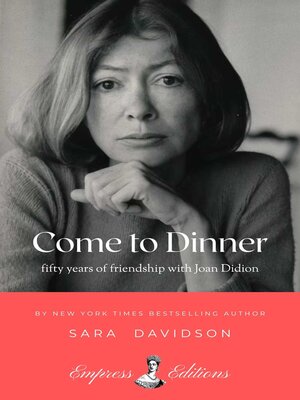
Sign up to save your library
With an OverDrive account, you can save your favorite libraries for at-a-glance information about availability. Find out more about OverDrive accounts.
Find this title in Libby, the library reading app by OverDrive.



Search for a digital library with this title
Title found at these libraries:
| Library Name | Distance |
|---|---|
| Loading... |
"An icon, unmasked. A friendship, unforgettable."
Joan Didion like you've never seen her—generous, wry, and deeply human.
A rare, revelatory portrait of Joan Didion—told not through her essays or fame, but through fifty years of unshakable friendship.
When journalist and novelist Sara Davidson met Joan Didion in the 1970s, neither could have predicted the decades of dinners, deep conversations, and quiet rituals that would follow. In Come to Dinner, Davidson opens the door to their private world, offering an intimate memoir of literary sisterhood—one filled with tenderness, wit, and the kind of wisdom exchanged only across time and trust.
From Malibu beach walks to Manhattan suppers, shared grief to unguarded hilarity, Davidson captures the Joan few ever saw: fiercely loyal, disarmingly funny, and unwavering in her support of other women writers. What emerges is not a biography, but a deeply human portrait—of Joan as a friend, mentor, and kindred spirit.
For fans of The Year of Magical Thinking, Sontag: Her Life and Work, and Let Me Tell You What I Mean, this is a story not just of Didion's legacy, but of female friendship as a radical act of love, creativity, and survival.
Joan Didion like you've never seen her—generous, wry, and deeply human.
A rare, revelatory portrait of Joan Didion—told not through her essays or fame, but through fifty years of unshakable friendship.
When journalist and novelist Sara Davidson met Joan Didion in the 1970s, neither could have predicted the decades of dinners, deep conversations, and quiet rituals that would follow. In Come to Dinner, Davidson opens the door to their private world, offering an intimate memoir of literary sisterhood—one filled with tenderness, wit, and the kind of wisdom exchanged only across time and trust.
From Malibu beach walks to Manhattan suppers, shared grief to unguarded hilarity, Davidson captures the Joan few ever saw: fiercely loyal, disarmingly funny, and unwavering in her support of other women writers. What emerges is not a biography, but a deeply human portrait—of Joan as a friend, mentor, and kindred spirit.
For fans of The Year of Magical Thinking, Sontag: Her Life and Work, and Let Me Tell You What I Mean, this is a story not just of Didion's legacy, but of female friendship as a radical act of love, creativity, and survival.







